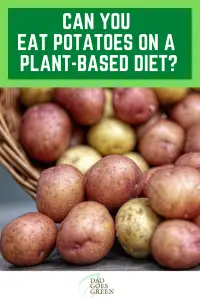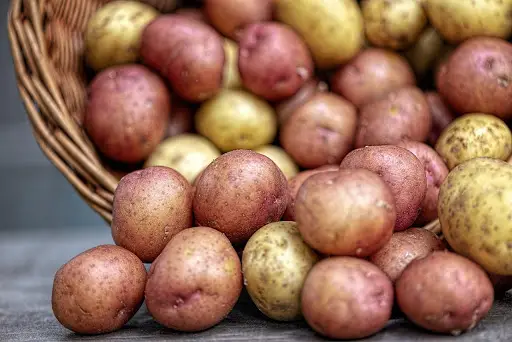Potatoes are truly versatile and taste delicious in every way. However, most people who switch to a plant based diet often have one question. Can you eat potato on a plant based diet?
Let’s be honest, potatoes don’t really enjoy a good rap in the health and fitness world. But let’s not forget that it’s one of America’s most favorite vegetables. According to data from USDA, potatoes alone make up 15% of the total farm sales.
This vegetable is so central in our lives that it’s hard to ignore. So what you’re looking for is a healthy way to consume the spuds. After all, they have a lot of health benefits too.
What is Potato Exactly?
Potato’s history is rather interesting, as it’s not native to North America or Europe. Its origins are in present-day Peru. Spanish explorers brought these tubers back to Europe, where they quickly became a staple. It’s interesting that the potato traveled from South America to Europe and then on to the US.
Potatoes are tubers that are part of the nightshade family. There are nearly 2000 varieties of potatoes today, with the most common being the russet potatoes. These are mostly starchy vegetables, while some have a waxy texture.
These tubers are pretty versatile in terms of cooking. You can bake, fry, boil, roast, and steam them. Usually, this depends on the texture of the variety, as to which method of cooking brings out the best taste.
Types of Potatoes
There are so many varieties of potatoes that you might not even encounter all of them in a lifetime. However, there are some that dominate the world of tubers.

Here’s a brief guide to different types of potatoes:
Russet
These potatoes have a russet-colored skin, hence the name. Since they are heavily starchy, they make a good choice for mashes and baking. Usually, these are large in size and have a thick skin.
Red Bliss
Red Bliss potatoes have reddish skin. This variety is waxy with creamy white flesh. Since they have a mild flavor, you’ll find these mostly in salads and fillings.
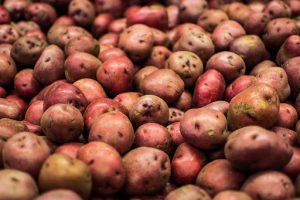
Yukon Gold
Yukon gold is an all-purpose potato, so you can use it in many ways. These have a similar color skin and flesh, which is light yellow. While you can bake and boil them, these are quite popular for fries.
Fingerling
Fingerling potatoes are no longer than three inches and usually have a narrow body, much like fingers. They have a firm but moist flesh with a mild and earthy taste. These are a waxy variety, so best for boiling, baking, and roasting.
Purple Peruvian
The Purple Peruvian is another all-purpose potato variety with a distinct dark purple color (both skin and flesh). These often have subtle white marbling. In terms of taste, these are more on the nutty and earthy side.
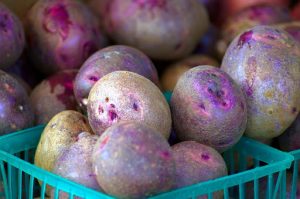
Katahdin
Katahdin potatoes are widely used for making french fries. This is because these are starchy and fluffy, and absorb flavors well. While their skin is buff, the flesh is almost white. These are soft when cooked, so generally not a good choice for salads.
All Blue
The all blue potatoes have a dark blue color, almost purplish. These are quite rich in antioxidants as compared with other varieties of potatoes. The indigo skin can provide a nice aesthetic to any dish.
New Potato
Any potato that’s harvested young is a new potato. These are small and round in shape. Since the sugar in these potatoes has not exactly kicked in, they are not as starchy. The color usually varies depending on the type.
Nutrient Profile of Potatoes
It’s difficult to generalize the nutrients of potatoes as they vary based on the variety. Perhaps that’s one of the reasons why people don’t fully understand their benefits. Potatoes are rich tubers with many different kinds of nutrients to offer.
Here’s a nutrient chart for potatoes in different forms based on data from the USDA Food Central database. As you can see, the nutrient breakdown varies by the type of potato and also how they are cooked.
| White Potato, raw, with skin | Russet Potato,,baked | Potato, french fries | |
| Calories | 69 | 97 | 224 |
| Carbs | 17 grams | 21.4 grams | 23.23 grams |
| Protein | 1.7 grams | 2.6 grams | 2.5 grams |
| Fat | 0.1 grams | 0.1 grams | 14.07 grams |
| Fiber | 2.4 grams | 2.3 grams | 1.8 grams |
| Potassium | 407 mg (12% of RDI) | 550 mg (16% of RDI) | 435 mg |
| Sodium | 6.0 mg | 14.0 mg | 295 mg |
| Vitamin C | 33% of RDI | 22% of RDI | 7.8 mg |
| Vitamin B6 | 10% of RDI | 18% of RDI | 0.237 mg |
It may be hard to pin down exactly how much of each nutrient you may be getting. However, almost all potatoes are rich in these nutrients:
Potassium
Potassium is a vital mineral for daily intake. You need 4700 mg of Potassium every day. Many people don’t get nearly enough of it.
Potatoes are quite rich in this mineral and it can help lower blood pressure. There’s more Potassium in a medium-sized potato than a banana, tomato, or even broccoli.
Vitamin C
Potatoes are also rich in Vitamin C. Only one medium-sized potato can give you one-third of the recommended daily Vitamin C. This water-soluble vitamin can do wonders for your body.
First of all, it’s an antioxidant. Secondly, it produces collagen that’s great for your skin. It can also help with the digestion of iron and make your immunity stronger. Most of it is in the flesh, so you still get plenty of Vitamin C even if you remove the skin.
Vitamin B6
One way potatoes can offset the starchy carbs is through their Vitamin B6 content. This vitamin has been found to aid carbs and protein metabolism. It also helps with the production of amino acids for protein.
Most importantly, it’s a component for the synthesis of hemoglobin. Needless to say, this is a crucial vitamin for your body, and potatoes can cover 10% of your daily intake.
Other Benefits of Potatoes
Besides being rich in these vital nutrients, potatoes have some other health benefits as well. Potatoes can provide important antioxidants like phenolic acids, flavonoids, and carotenoids. These antioxidants can help prevent life-threatening heart diseases, as well as cancer.
Moreover, potatoes also contain resistant starch. This type of starch does not get digested and passes on to the large intestine. Here it feeds the good bacteria, which helps with nutrient absorption and improves overall digestion.
Are Potatoes Bad For You?
Even though potatoes have their fair share of nutritional benefits, they often come under fire for being unhealthy. First of all, these are highly starchy vegetables, so they are rich in carbs. Too much consumption of starch can result in weight gain.
Not all potatoes are bad or result in weight gain. However, some varieties and products can cause weight gain. Many times it’s not the potatoes that are the culprit, but the other foods we combine with them.
As you can see from the chart above, french fries have a higher number of calories and are also rich in fat because of the oil. So it comes down to really how you’re eating potatoes.
Potato chips, for instance, are plant-based, but may not be a very healthy snack option. A study conducted over a five-year period found that snacks like potato chips result in a bigger waist in women.
Potato products like french fries and chips have high calories to begin with. So it’s not necessarily the potatoes causing the weight gain. What many people forget is that simply consuming a lot of calories is unhealthy, regardless of the source.
In addition to the high starch content, potatoes may also contain certain compounds that are not healthy.
Glycoalkaloids
Glycoalkaloids are common in the nightshade family potatoes come from. It’s a toxic compound that’s present in potatoes that have turned green.
Potatoes turn green when they are exposed to sunlight. This exposure can potentially increase the amount of glycoalkaloids.
This compound is not dangerous in small amounts, but long-term exposure can be hazardous. Fortunately, most of it is found in the peel, which is usually peeled and often not consumed.
Acrylamides
Fried potatoes usually have acrylamides. They are a chemical compound that form in foods rich in carbs, especially when cooked at high temperatures. So you’ll find these in french fries and chips.
According to a scientific study, these compounds in fried potatoes have been associated with cancer. Similarly, another study published in the American Journal of Clinical Nutrition found that those who consume fried potatoes at least twice a week saw their mortality risk increase.
Guidelines to Eating Potatoes on a Plant based Diet
It’s very much possible to enjoy potatoes in your plant based diet and circumvent the few health risks. If you make healthy choices about how you consume them, you can benefit from the many nutrients.
There are so many delicious and healthy ways to eat potatoes. For instance, these roasted red potatoes and potato salad with horseradish vinaigrette recipes are downright delicious, but also healthy.
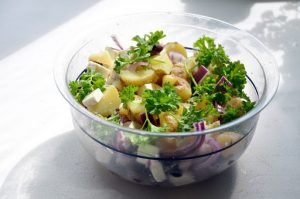
Here are a few ways you can make potatoes healthy:
- Treat them as carbs, so don’t consume them as a vegetable in your meal
- Avoid eating fried potatoes often as they have a high number of calories
- Try using the peel of potatoes as it’s rich in fiber and minerals
- Reduce the amount of fat you eat when eating potatoes as carbs and fat is not good combo
- Use whole potatoes instead of processed ones
- Try cooking potatoes without oil.
Some varieties of potatoes are healthier than others. For instance, purple potatoes are rich in antioxidants. Try to use the most healthier potatoes, but make sure to understand whether they are starchy or waxy.
FAQs
What Happens If You Eat Potatoes Daily?
Potatoes’ health benefits override their health risks if prepared in the right way. There’s no harm in consuming potatoes daily, per se. However, consuming too much of it every day can likely result in weight gain.
If you really like potatoes, you’ll have to be a bit more careful about what you eat with them and how you prepare them. As long as you’re not frying, it should be safe to eat a medium-sized potato daily. I like to combine my potato servings with some cruciferous veggies like broccoli and cauliflower. You can also pair them with steamed carrots and roasted onion, as well.
How Many Potatoes Can I Eat a Day?
Since potatoes are starchy, they will contribute towards your overall carbohydrate intake. According to the Dietary Guidelines for Americans, 900 to 1300 calories should come from carbs (when consuming 2000 calories a day). Therefore, you have to be mindful of these numbers when eating potatoes.
From these standards, you can eat ten to twelve baked potatoes in a day, as long as you don’t consume any other carbs. Of course, this would not be a very healthy choice to make. I recommend eating a rainbow of different fruits and vegetables each day.
It also depends on how you cook the potatoes. Eating baked or boiled potatoes is not the same as eating french fries.
Can You Eat Potato Chips on a Plant based Diet?
The ingredients of potato chips are all plant based, but it’s not a healthy snack. There are a lot of calories in them. If you eat potato chips, be mindful of the portion. Buy the 1 oz. snack size bags and LIMIT YOURSELF TO ONE BAG! 🙂 Chips are very easy to overeat mindlessly while watching TV.
There’s no harm in eating potato chips once in a while, but don’t make a habit of eating them every day. When on a plant-based diet, you want to get all the necessary nutrients. Unfortunately, frying potatoes rips them of many nutrients.
Are Potatoes Healthier than Pasta?
Potatoes pack in more energy-giving carbs in comparison with pasta. While both these food items are starchy, pasta is heavily processed. Also, it does not contain many beneficial minerals and vitamins that potatoes do.
On the other hand, you should moderate both when you’re cutting down carbs to shed some pounds. Even though the carbs in potatoes are not processed, they still are starchy.
Wrap Up
It’s amazing how you can cook and eat potatoes in so many shapes and forms. To be more conscious, choose the recipes based on their health outcome. And who says that can’t be delicious?
If you follow the tips highlighted here, you can make potatoes more healthy. That said, it’s perfectly fine to slip off the track and eat that bag of chips once in a while.
You may also like: WHAT CAN YOU EAT ON A PLANT BASED DIET? >>CLICK HERE!
Below is a Pinterest friendly photo…. so you can pin it to your Veggie Board!!
